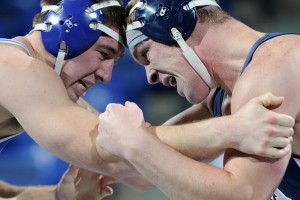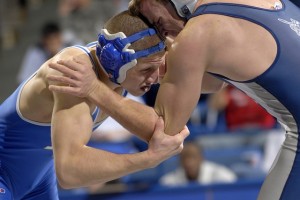- Calls to this hotline are currently being directed to Within Health or Eating Disorder Solutions
- Representatives are standing by 24/7 to help answer your questions
- All calls are confidential and HIPAA compliant
- There is no obligation or cost to call
- Eating Disorder Hope does not receive any commissions or fees dependent upon which provider you select
- Additional treatment providers are located on our directory or samhsa.gov
Male Wrestlers and Bulimia – How Does It Happen? What Do Coaches and Parents Need to Know?
Contributor: Crystal Karges, MS, RDN, IBCLC, Special Projects Coordinator at Eating Disorder Hope/Addiction Hope

This helps further the advancement of treatment and encourages those who are struggling to seek out the appropriate help and care that is needed for recovery and healing.
Athletes in sports that emphasize a particular body size, structure, and weight may be more susceptible to developing an eating disorder, particularly if they are already genetically predisposed to having an eating disorder. While many factors contribute to the development of these mental illnesses, bulimia can be triggered by psychosocial, and environmental factors. Irrespective of gender, eating disorders can develop in both males and females, including anorexia, bulimia and binge eating disorder.
Sports That Can Trigger Eating Disorders
Sports that may influence athletes towards disordered eating or trigger eating disorders include:
- Gymnastics
- Dancing
- Long-distance running
- Wrestling
How Wrestling Can Often Be Worse

Because wrestling often demands athletes have a lean body build, wrestlers will commonly engage in abnormal eating and exercise behaviors in attempt to meet the rigorous body demands that are typically created by the sport.
For wrestlers who are attempting to drop their weight rapidly, such as for an upcoming event or match for example, it is common to turn to drastic behaviors to compensate for food eaten. This might include behaviors that may be characteristic of bulimia nervosa, such as self-induced vomiting, laxative or diuretic abuse, or other forms of “ridding” the body of fluid and food. While male wrestles athletes may do so in attempt to excel or get ahead in their sport, this can lead to dangerous health consequences, both mentally and physically.
Observing Disordered Behaviors
Coaches are often at the frontline of observing dangerous behaviors among their athletes and can be one of the first to intervene. Wrestling coaches can simply become more aware of the fact that a sport that strongly emphasizes weight and body size may trigger some of their athletes to take such behaviors.
If you are a coach and suspect that one of your athletes may be struggling with bulimia, be aware of the following signs and symptoms:
- Lethargy, lack of stamina or endurance
- Possible weight fluctuations
- Bloodshot eyes
- Smell of vomit
- Frequent disappearance to bathrooms after meals and/or snacks
- Avoidance of social events or functions that involve food
- Increased anxiety and/or depression
- Laxative and/or diuretic abuse
How to Approach an Athlete with Help

The truth of the matter is that they might be setting themselves for more dangerous consequences down the road. Seeking out intervention and treatment as early as possible can help the progression of these dangerous behaviors, many that are often associated with a severe eating disorder.
Pointing an athlete towards helpful resources, such as a support group, a campus wellness center, a counselor or other specialist can give them the motivation to seek out the appropriate help they need. By offering your unconditional support as a coach and mentor, you can help encourage your athlete to find recovery and healing.
Community Discussion – Share your thoughts here!
Are you a male wrestler who has struggled with bulimia? What were some of the challenges and obstacles you faced in overcoming these illnesses? How did you find hope for recovery and healing?
References:
- Oppliger RA, et al. Bulimic behaviors among interscholastic wrestlers: a statewide study. Pediatrics 1993 Apr; 91(4): 826-31.
Last Updated & Reviewed By: Jacquelyn Ekern, MS, LPC on June 19th, 2015
Published on EatingDisorderHope.com
